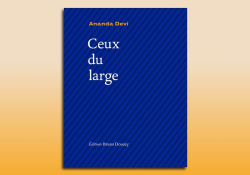Ananda Devi’s Light in Translation: A Celebration of Literature from the “Margins”

Ananda Devi’s principal English-language champion makes a case that “publishing Devi is an act of resistance, of amplifying a voice, an entire nation and population that has been too long overlooked.”
The beauty of books is how they move, cross boundaries, and transform the reader who touches them. To publish two books by Ananda Devi—Eve Out of Her Ruins and When the Night Agrees to Speak to Me—at Deep Vellum is a kind of cosmic victory, a chance to bring an extraordinary voice into English from a country and literary tradition that we knew so little about before she introduced us to Mauritius, an island whose history and traditions have now changed world literature forever. It’s the quiet thrill of knowing that Devi’s words, which are built from grit and the raw materials of human resilience, can reach new readers—and that we’ve helped to make that happen. With Eve Out of Her Ruins and When the Night Agrees to Speak to Me, we’re opening a door for readers to step into the intensity of a world that’s both distant and, paradoxically, deeply familiar.
There’s a luminous quality to the arrival of two books, perhaps more so when they’ve traveled a long way to rest in a reader’s hands. Publishing Ananda Devi's Eve Out of Her Ruins and When the Night Agrees to Speak to Me at Deep Vellum has been like tracing fragments of starlight across pages, each syllable calling out with its own fervent, unmet yearning. Devi writes from the margins—geographically, linguistically, culturally—and it’s this very distance, this very exile, that makes her work blaze with urgent beauty, proving that the concept of the margins limits our own understanding of the fullness of the world’s potential.
Devi writes from the margins—geographically, linguistically, culturally—and it’s this very distance, this very exile, that makes her work blaze with urgent beauty.
Imagine a book traveling across oceans and boundaries of language, gathering stories like pearls strung out in narrative strands that have waited for years to be understood by those who could only catch glimpses from a distance. That’s what Devi’s work does, almost effortlessly. It’s as if each line is born not only of her own lived Mauritian experience but from an ancient well of collective memory and voices rarely heard in English. And now, here they are, freshly bound, reminders of the rewards that lie in wait for a voice to find its proper moment and stage.
Ananda winning the 2024 Neustadt Prize feels like a long-held dream made real for all who have championed her work, and not just for all of us at Deep Vellum, but for our colleagues and friends at Host Publications, Feminist Press, and, soon, Farrar, Straus & Giroux, and especially for her translators. For Deep Vellum and for those of us who have long believed in her work, this recognition feels momentous, validating the peculiar gravity her words exert. This isn’t just a prize for a novelist from Mauritius, though.
It’s not just a prize for a brilliant novelist—it’s recognition of the lives she writes about, the all-too-real individuals and communities she brings to the page with honesty and love. When readers meet Eve, Devi’s protagonist in Eve Out of Her Ruins, they encounter a young woman trapped in the labyrinth of Port-Louis, the capital of Mauritius, a city marred by poverty and violence but alive with an unbreakable pulse, on an island unknown, neglected by so much of the world. Eve embodies the city’s anguish and its hope, its hidden beauty and its relentless desire to be seen. Her story, told in Devi’s fierce, unflinching prose, reaches out from the margins and demands recognition from those who might otherwise pass by without noticing. Publishing this book is an act of resistance, of amplifying a voice, an entire nation and population that has been too long overlooked.
Publishing Devi is an act of resistance, of amplifying a voice, an entire nation and population that has been too long overlooked.
In translating her work and releasing it into the hands of readers, we don’t just open a door to Devi’s world; we open windows into our own in ways we might not expect. The stories may seem to take place in worlds we’ll never see, but they hold up mirrors to our own hypocrisies and cultural blind spots, inviting the dialogue that happens intimately between reader and writer on the page, and in the broader social sense of entire cultures conversing through literature. This, perhaps, is Devi’s quiet magic. Her words challenge even as they connect, slipping past the security barriers we’ve erected between ourselves and “the other.” They remind us that the “other” is, in fact, not other at all, but as close to us as our own hands.
When the Night Agrees to Speak to Me is different—it’s a soul-baring, poetic work that blurs lines, speaks straight from the darkness, and invites readers to listen as if the night itself is leaning close to tell its secrets. Here, the night is Devi’s co-conspirator, a witness to all the unspeakable things we try to hide in the daylight. The language isn’t restrained by traditional forms; it’s like a song that transcends place, unbound by borders, and it becomes something deeply personal. It is a nighttime monologue that doesn’t so much address the reader as it beckons them into an intimate shadow-space where memory and desire intertwine. The night is a character here, a lover, a confessor, a witness. And it’s this very darkness that becomes a vessel, one where unspeakable things take shape not just in whispers, but in full, declarative sentences that insist on visibility. This is the Devi who’s writing from her heart and memory and daring us to come closer, to really listen.
To publish this work at Deep Vellum, to let it nestle next to the works of other writers from places that rarely make the mainstream, is an act of small, defiant joy. Publishing Devi alongside so many writers who speak from the “margins,” yet who demonstrate that the center of the world is within us, is not just about publication for us—it’s a commitment to widening the space for stories that challenge us, stories that aren’t here to comfort but to confront and expand us—from Dallas to Port-Louis, from the world within to the world without. It’s as though the very presence of these books on our shelves, in our bookshops, is a way of saying: here is something beautiful from where you least expect it. Here is a voice that refuses to be silenced, that insists on pressing its handprint into the walls of a literature so often shaped by colonial forces, even from behind the scenes.
The translators of these works are as integral to this celebration as Devi herself.
The translators of these works are as integral to this celebration as Devi herself. Jeffrey Zuckerman’s work on Eve Out of Her Ruins brings an intensity and empathy to the English version, preserving the stark beauty and the rhythms of Devi’s prose that make her characters so alive. Translating Eve is no easy feat—it’s raw, textured, as unfiltered as the city it’s set in. Zuckerman’s English moves with the same grace as Devi’s French, capturing every breath, every shadow that shapes Eve’s world. And Kazim Ali’s translation of When the Night Agrees to Speak to Me is as much an act of devotion as it is of translation. In English, Ali holds the silences and the whispers of Devi’s poetic voice, bringing across the intimacy and mystery of a voice that feels both ancient and urgently contemporary. These translators are the channels, the ones who let Devi’s work take new shape, opening her words to readers who might have thought they’d never hear her stories.
Publishing Devi is a promise we keep, not only to her and to her readers but to literature itself—literature that is willing to dive into the margins, the unknown, and make it sing, bringing the margins within and reshaping the literary canon for future generations. For Deep Vellum, this is what it’s all about: to give space to the extraordinary, to trust the voice that knows its own worth, and to let it reach the hands, the minds, the souls that need it.
Dallas, Texas











